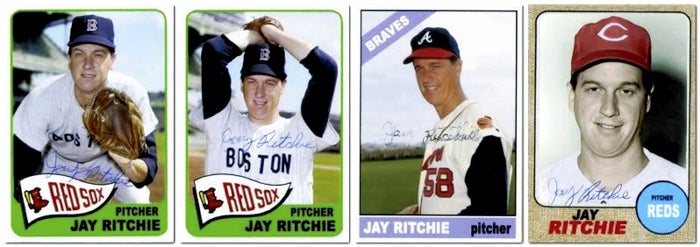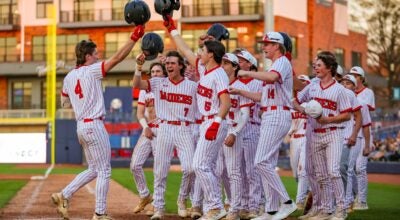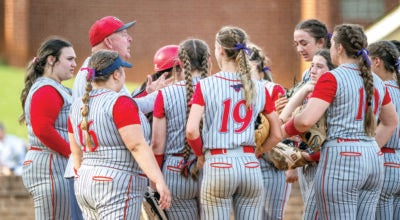Jay Ritchie’s American Legion career was exciting but brief
Published 12:00 am Friday, April 8, 2016

- bobscustomcards.blogspot.com... Baseball cards of Jay Ritchie during various years of his major league career.
SALISBURY — Jay Ritchie was good enough to pitch in the major leagues, and he came along in Granite Quarry in the 1950s when American Legion baseball was becoming huge in Rowan County.
That’s probably why every time the Salisbury Post publishes its Legion record book, someone calls wondering why Ritchie’s name isn’t on the all-time list for wins and strikeouts.
We’ll get to that.
Ritchie died three months ago, passing away at age 80 after a long and productive life.
Baseball encyclopedias list Ritchie as being born in 1936, but the obituary information sent in by his family made it clear he actually was born in 1935.
That means he was 19, not 18, when he was pitching all those shutouts for Granite Quarry High in 1955. That doesn’t diminish his amazing prep career at all, it just means he was a year older than most people thought he was.
Herman Ritchie, Jay’s brother, is a regular at Catawba games at Newman Park, and when he expressed curiosity about Jay’s Legion career, it was time to look it up. Herman remembered Jay playing Legion, but he didn’t know when. He didn’t see his brother pitch at Newman Park because he was in the service.
Ritchie did pitch a season for the Salisbury American Legion team coached by legend Joe Ferebee. That was in the summer of 1952 when Ritchie was 16. He turned 17 that November.
Ritchie didn’t return for the 1953 season — he may not have been eligible — when Ferebee’s main pitchers were Tom Eaton and Jerry “Doodlebug” Thompson.
The 1952 season included the odd rulings and protests that often are part of Legion baseball. And while it was a wild ride, it was a brief, 15-game season for Salisbury.
Salisbury played in an eight-team league that included Kannapolis, Concord, Rockingham, Monroe, Albemarle, Troy and Spencer. Teams played 14 regular-season games. The top four qualified for the “Junior” playoffs.
This was years before there was a Rowan County team, so neither Salisbury nor Spencer had a huge area from which to draw. The best team was Kannapolis. Kannapolis had Landis’ Billy Barnes, who would star at Wake Forest and in the NFL, playing third base. Kannapolis also had a pitcher, Ron Blackburn, who would reach the major leagues in the late 1950s with the Pittsburgh Pirates.
Salisbury’s scrappy team, which featured slugging first baseman Jim West, was labeled the “Whiz Kids,” stealing a nickname from the underdog Philadelphia Phillies squad that won the 1950 World Series.
Ferebee basically had a two-man pitching staff — Jimmy Kyles and Ritchie.
Salisbury started fast, winning five of its first six, including an epic upset of Kannapolis.
Ritchie won that one at Newman Park, pitching all nine innings, which was expected then.
He struck out seven. He also walked seven, but he held a powerhouse lineup to two runs. Salisbury won, 3-2, when Sonny Barringer produced a walk-off, two-run single.
But Salisbury headed downhill after a surprise loss to seventh-place Spencer.
Salisbury also lost the rematch at Kannapolis. For the second time, Ritchie’s mound opponent was Howard Hall, who is remembered as A.L. Brown’s first quarterback. Ritchie shut out Kannapolis for the first five innings, but Kannapolis got to him in the sixth for seven runs.
Ferebee called on Ritchie more often as things got desperate. Ritchie started five of Salisbury’s last seven games.
A bitter loss to Concord — a critical call at the plate was reversed after an umpire got an earful from the Concord coach — hurt. Ferebee lodged a protest — to no avail — and Salisbury had a 6-7 record.
Salisbury had to win its regular-season finale against Concord to have a chance to make the playoffs.
So Ritchie took the ball. Jimmy Willis went 4-for-4, and Ritchie held Concord to one earned run. Ritchie only struck out four, but he evened his record at 4-4.
Now Salisbury was 7-7 and tied for fourth with Monroe.
What happened next was astounding. Salisbury got late notice that it would be playing Monroe in a play-in game at neutral Albemarle for a playoff berth.
There were no cell phones, and it was the Fourth of July. Apparently, some Salisbury players had headed off on vacation. The Post reported four members of the already thin squad couldn’t be located, so Salisbury played Monroe short-handed.
They did manage to find Ritchie. He was the starting pitcher — on one day’s rest.
Ritchie’s mound opponent was a hard-throwing right-hander named John Tsitouris, who would be signed by the Detroit Tigers two years later.
Tsitouris was too much for Salisbury. He struck out 10. Monroe won, 5-2.
Salisbury ended the season with a 7-8 record. Ritchie was officially 4-5, a noble effort, but well short of making the all-time Legion record book.
Kannapolis and Concord eventually played for the league championship. Kannapolis won when Barnes tripled in the ninth inning and stole home. Kannapolis went on to win its third state title.
Tsitouris made the major leagues with the Tigers in 1957, seven years before Ritchie reached “The Show” with the Boston Red Sox. Tsitouris’ son, Marc, was a standout player for Wingate in the early 1990s and played against Catawba at Newman Park.
Tsitouris, who pitched five shutouts in the big leagues, and Ritchie would both play for the Cincinnati Reds in 1968. Both threw to rookie catcher Johnny Bench. It was the last year either of them would play in the majors.
Tsitouris was demoted to Triple-A Indianapolis by the Reds in May, 1968, after he started the season 0-3. Ritchie began that season in Indianapolis and was promoted to Cincinnati in June.
That means for about a month, Ritchie and Tsitouris were teammates in Indianapolis. They probably had a chance to chat in the bullpen about their American Legion matchup 16 years earlier.
Tsitouris died on Oct. 22, 2015, less than three months before Ritchie passed away.





